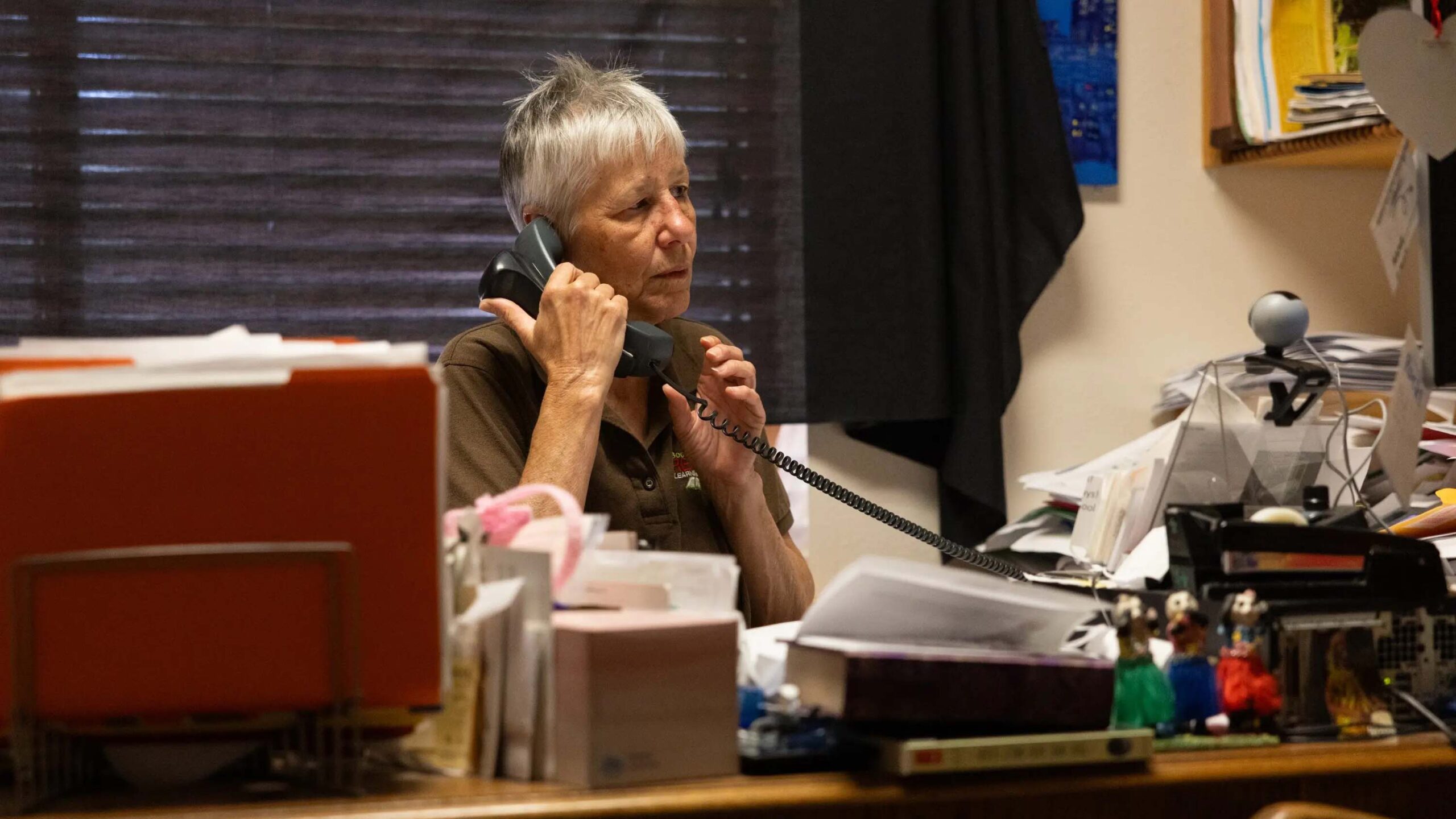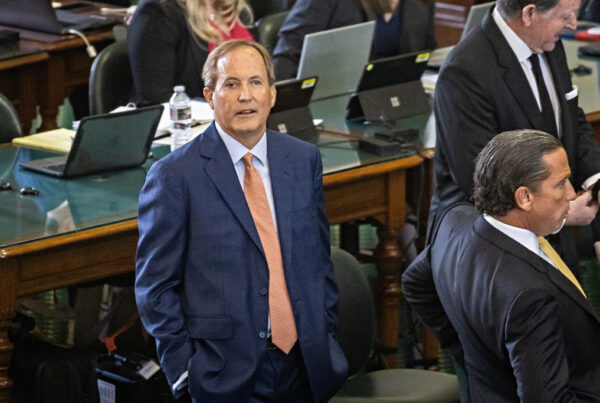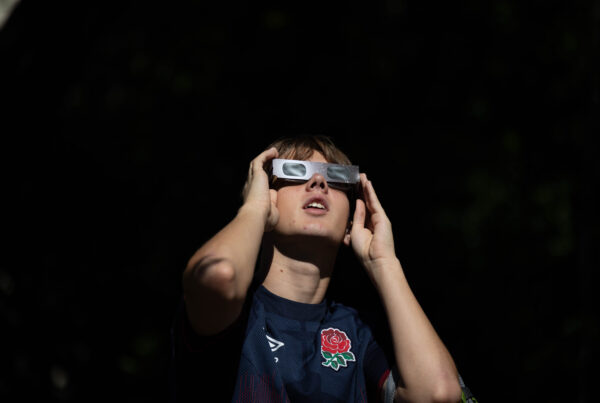From The Texas Tribune:
or 24/7 mental health support in English or Spanish, call the Substance Abuse and Mental Health Services Administration’s free help line at 800-662-4357. You can also reach a trained crisis counselor through the Suicide and Crisis Lifeline by calling or texting 988.
SMITHVILLE – When the COVID-19 pandemic first shut down the Smithville Public Library, it was as if a vital community artery had been severed.
“We did see a lot of anxiety when people felt cut off from reading materials,” recalled Judith Bergeron, the library’s director. “Some of that anxiety led to anger directed at library staff, so it was important to us to try to provide whatever services we could remotely.”
But for Bergeron, libraries – especially in small Texas towns like Smithville – are more than a book lending depot. In 2018, she recognized a need for mental health services in this 4,000-person town 45 miles east of Austin, and she set up a “Coffee with a Counselor” program allowing patrons who need to, a private study room to meet with a mental health professional over coffee.
The pandemic, however, ushered in a whole next level of isolation. The business shutdowns had left residents here without their nerve center, the public library. And that’s when Bergeron hatched a new plan. She created five different book clubs for her more marginalized neighbors: military veterans, people of color, teenagers, Spanish speakers and members of the LGBTQ+ community. With the help of a $15,000 grant from the St. David’s Foundation, the program proved successful.
The book clubs were such a hit in conservative Bastrop County, some of the participants joined the library’s general monthly book club, and the LGBTQ+ book club still meets monthly.
“I had one of them tell me this is the one place they feel safe and comfortable in, and isn’t that the definition of what the library is meant to be? A place to feel safe,” Bergeron said.
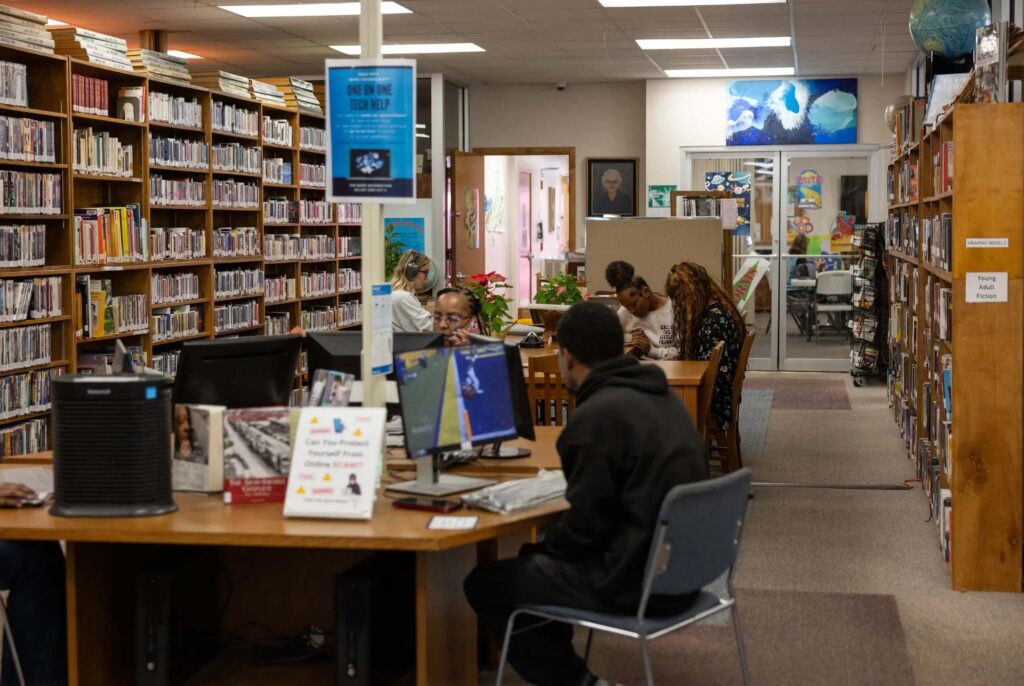
Residents of Bastrop County at the Smithville Public Library.
Maria Crane for The Texas Tribune
Bergeron and her efforts in Smithville are part of a growing effort among libraries to put more mental health care resources into their community.
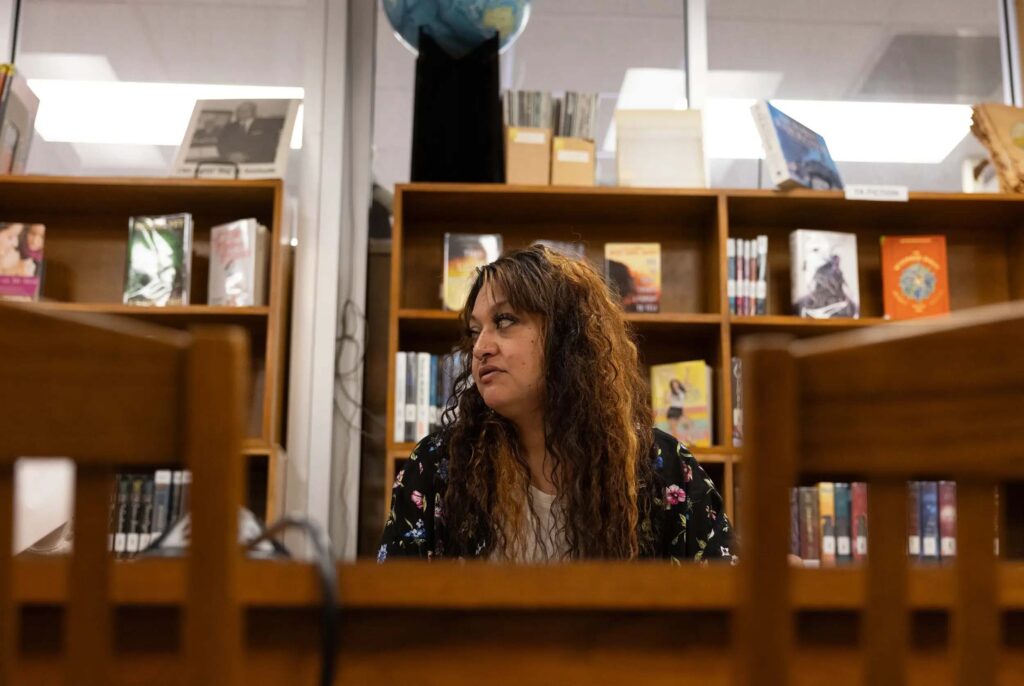
Brittany Flores in the Smithville Public Library on March 11, 2024.
Maria Crane for The Texas Tribune
But when Flores learned at the start of 2022 that she was being assigned to work in her town’s library, she was slightly confused. What did her new job have to do with a rural public library?
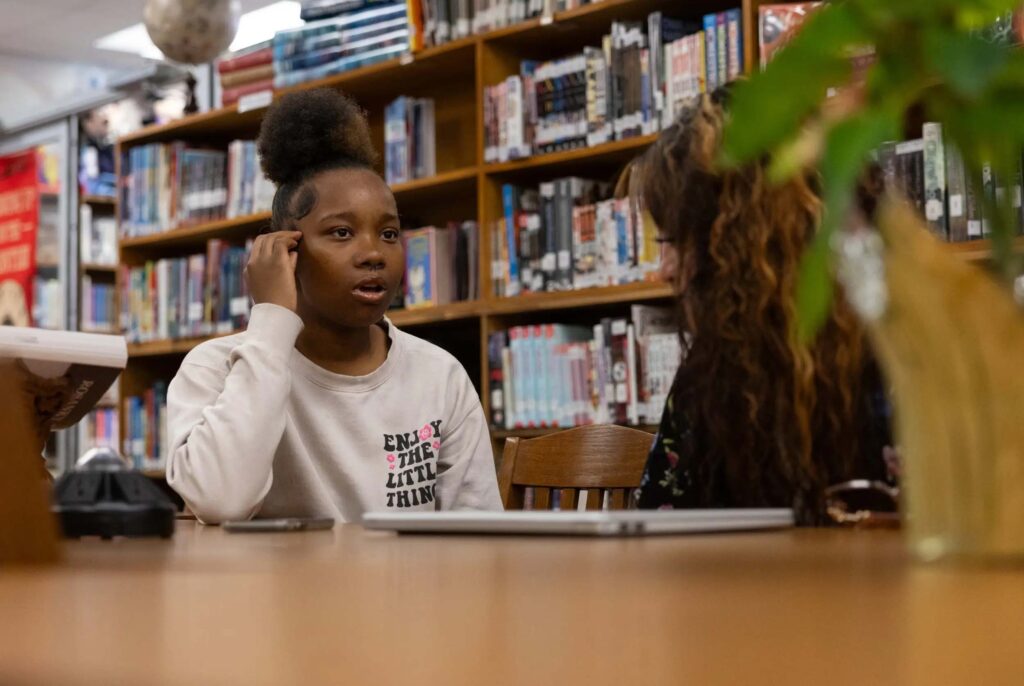
Jalen speaks with Brittany Flores in the Smithville Public Library. Jalen is one of Flores’ patrons, and she meets with Flores for some help and guidance when she needs.
Maria Crane for The Texas Tribune
“I don’t tell anyone to do anything. I just tell my story and listen. I always ask them what they would do in my situation, which gives me insight into what they may be going through. Sometimes, someone just needs somebody to talk to,” Flores said.
When Smithville resident Donella McLean saw Flores working with people in the library, she became curious about her role.
McLean herself had been living with bipolar and post-traumatic stress disorder while raising her daughter alone.
“People tend to gravitate towards the library because it’s free, and a lot of mentally unstable people have limited funds. They naturally go somewhere where it’s not going to cost them anything,” McLean said. “I always thought to myself they need a mental health worker here because just having someone to talk to helped me so much.”
Now, McLean is in peer support training, and once completed, she hopes to be assigned to another Central Texas library to do what Flores is doing in Smithville.
“I think I always wanted to be a peer support specialist. But I never had the means to do it until now,” McLean said. “I know that you can survive (mental illness). I feel that I’m a success story in many ways, and because of that, I feel called to share that with others.”
The community anchor
For years, Bergeron has kept a heart-shaped locket on her keys to remind herself to take care of her mental health. When Flores began working at the library, Bergeron decided she needed to do more and started making hand-made clay pocket hearts available to everyone who walked into the library.
Late last year, a woman came into the library to return some books when she noticed the hearts and asked about them. When Bergeron told her they’d become a gentle reminder for patrons to think about their mental health, the woman told Bergeron how the library had been an essential part of her cancer treatments.
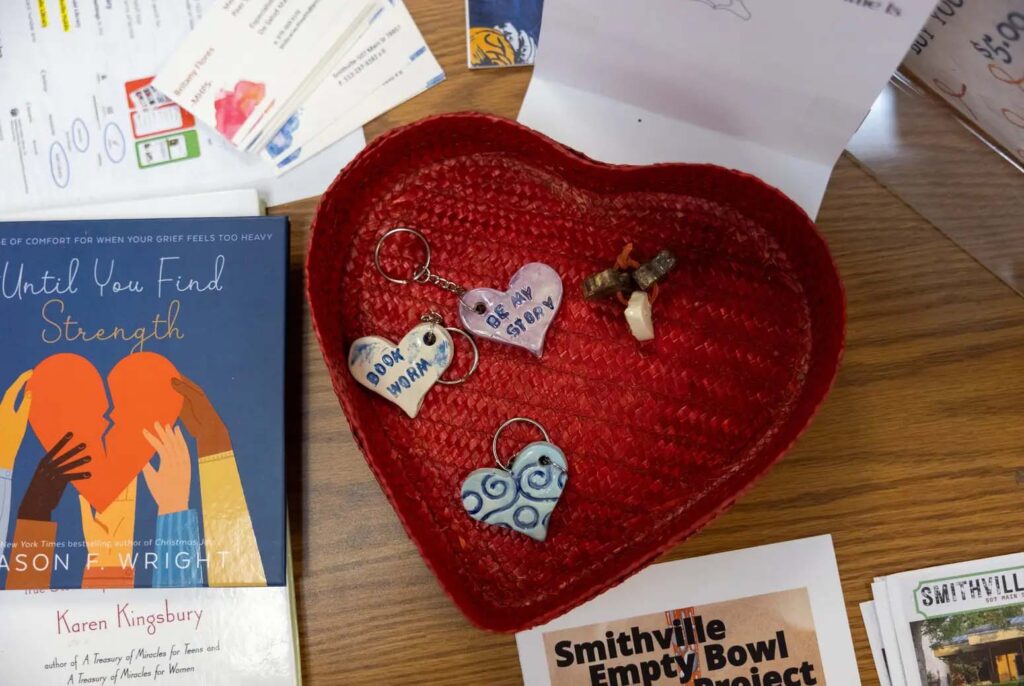
Pocket hearts sit in a heart tray in the Smithville Public Library.
Maria Crane for The Texas Tribune
“Every time she goes in for treatment, she goes to the library to get some books because she knows she will be sitting for a long time. She said we felt like part of her recovery team and started to cry when I gave her the heart,” Bergeron said. “She now has her chemo group helping make pocket hearts for the library.”
Elsewhere in Texas, libraries are finding more ways to help their patrons stay healthier.
South of Waco, the Hewitt Public Library has tapped American Library Association funds to create mental health kits, including stress balls and fidget spinners. In far North Texas, the Pottsboro Public Library, located near the Oklahoma border, used funds from the National Library of Medicine’s South Central Region to create a telehealth room for physical and mental health appointments.
“Rural libraries are different from suburban and urban libraries because many resources are already available in their community, so a library doesn’t need to do it. But in our community, if the library doesn’t do it, it won’t happen,” said Dianne Connery, Pottsboro’s librarian.
Lawmakers have attempted to address the mental health workforce problem in non-metro areas since 70% of Texas counties are rural by incentivizing mental health providers to practice in remote areas and expanding telehealth. However, this is a long-term measure and won’t fix the crisis in the short term.
To address this need, libraries have started to get creative with the resources available to them to continue their role as community centers where people can go and find resources on housing, employment, substance abuse services, and mental health.
Ree Kogun, a 65-year-old man who moved to Pottsboro six years ago, said he picked up a telehealth flyer at his local pharmacy in 2022 mentioning the library’s physical and mental health services. He has used the services ever since.
“I have a Walmart smartphone with a $25 monthly plan as my only internet access. At the library, they offer a large monitor and a very good connection to the internet. It is much better than doing my appointments on a small screen,” he said.
After Kogun began using the room for his medical telehealth appointments, he realized he needed a therapist for the stress and anxiousness he was dealing with after the COVID-19 pandemic because it was causing his blood pressure to spike.
“There are limited resources in Pottsboro, and the library offered me a chance to get better care from different doctors and therapists. My stress levels are lower, and so is my blood pressure,” he said.
Disclosure: St. David’s Foundation is a financial supporter of The Texas Tribune, a nonprofit, nonpartisan news organization that is funded in part by donations from members, foundations and corporate sponsors. Financial supporters play no role in the Tribune’s journalism. Find a complete list of them here.


